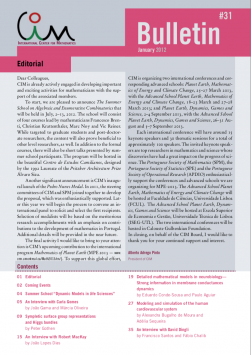Editorial
Alberto Adrego Pinto
1
CIM is already actively engaged in developing important and exciting activities for mathematicians with the sup- port of the associated members.
Coming Events
2-3
- 4th Porto Meeting on Mathematics for Industry
- 86th European Study Group with Industry 2012
- Summer School on Algebraic and Enumerative Combinatorics,
- Summer School “Dynamic Models in Life Sciences”
Carla Gomes
João Gama
Márcia Oliveira
3-5
Carla Gomes is a professor of computer science at Cornell University, with joint appointments in the computer science, information science, and Dyson School of applied economics and management departments. Her research has covered several themes in artificial intelligence and computer science, from the integration of constraint reasoning, operations research, and machine learning techniques for solving large-scale constraint reasoning and optimization problems, to the use of randomization techniques to improve the performance of exact search methods, algorithm portfolios, multi-agent systems, and game play.
Sympletic surface group representations and Higgs bundles
Peter Gothen
5-8
A surface group is the fundamental group of a surface. In this article we survey some results on representations of a surface group on a real vector space preserving a symplectic form. We emphasize in particular some results which have been obtained using holomorphic and algebraic geometry, through the use of Higgs bundles and a fundamental result known as the non-abelian Hodge Theorem. Though this theory itself is rather involved, the results on surface group representations can be explained without bringing it into play and this is one of our main aims.a
Robert MacKay
João Lopes Dias
8-10
Robert MacKay is currently Professor of Mathematics, Director of Mathematical Interdisciplinary Research and Director of the Centre for Complexity Science at the University of Warwick, United Kingdom. After completing his undergraduate studies at the University of Cambridge, he did his Ph.D. at the University of Princeton, United States. Since then he has held positions at several prestigious universities and research centres, including a professorship at the University of Cambridge. His research interests include Dynamical Systems and its applications to Physics, Engineering, Chemistry, Biology and Economics. He is a Fellow of the Royal Society of London, of the Institute of Physics and of the Institute of Mathematics and its Applications.
Detailed mathematical models in neurobiology-Storing information in membrane conductances dynamics
Eduardo Conde-Sousa
Paulo Aguiar
10-14
Neurons are Nature’s solution to the problem of information processing and information storage. Nervous systems have been engineered by evolution to sense information from the environment, process this information and store experiences for the purpose of improving future decisions. Ubiquitous in all these stages is the necessity of information buffers. In the case of mammals, there are different mechanisms providing storage in a wide range of time scales: from the ephemeral facilitation of a syn- apse to the life-long memories of childhood
Modeling and simulation of the human cardiovascular system
Alexandra Bugalho de Moura
Adélia Sequeira
14-18
The use of mathematical modeling and numerical simulation to study blood circulation and related pathologies is an active interdiciplinary field of research. It has a great social and economical impact mainly due to cardiovascular diseases, that represent one of the leading causes of death and morbidity in industrialized countries
David Dingli
Francisco Santos
Fabio Chalub
18-19
David Dingli was in Evora for the Summer School “Dynamic Models in Life Sciences”, where he presented a set of lectures called “Hematopoietic Stem Cells and Hematopoiesis”. In these lectures, he introduced the audience to the state-of-the-art in the dynamics of stem cells, and their relation to blood disorders. After the conference he gave this interview to Francisco Santos and Fabio Chalub, summer school co-organizers.
